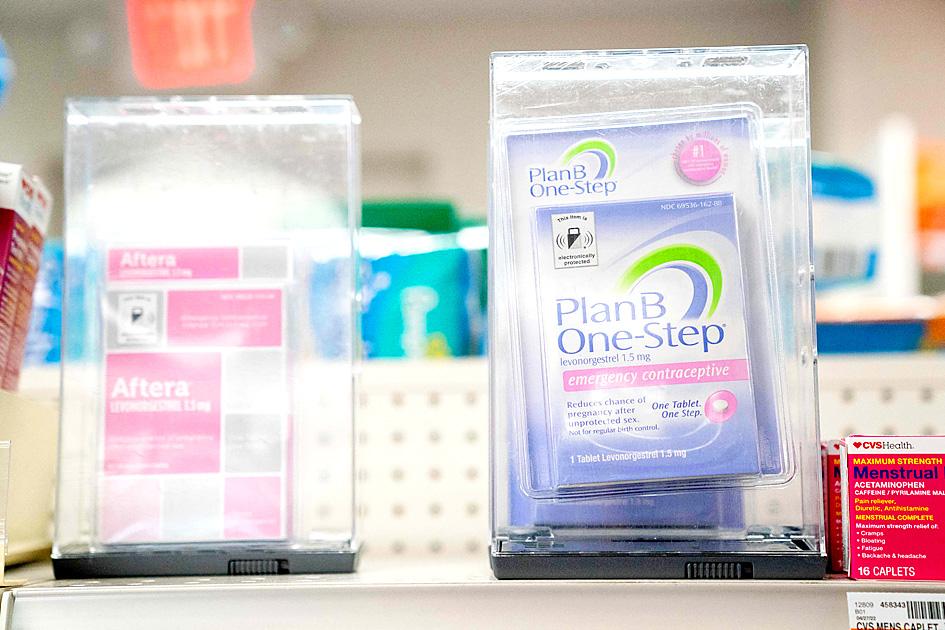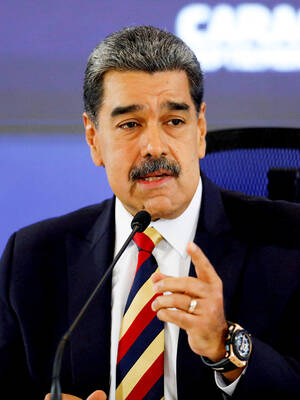Online retailer Amazon is limiting how many emergency contraceptives people can buy, joining other retailers who put in place similar caps following the US Supreme Court decision overruling Roe v. Wade.
Amazon’s limit, which temporarily caps purchase of the contraceptives at three units per week, went into effect on Monday, a spokesperson for the e-commerce giant confirmed.
The company did not share details on what emergency contraceptive products were limited for purchase, but a listing showed the cap applied to Plan B, the popular “morning after” pill.

Photo: AFP
A similar policy went into effect on Monday at the US drugstore chain Rite Aid, which has limited the purchase of Plan B pills to three units per customer due to increased demand, a company spokesperson said.
The limit applies to in-store and online purchases.
Emergency contraception is different from abortion pills used to end a pregnancy. Plan B, which can be obtained without a prescription, contains a concentrated dose of the same drug found in many regular birth control pills. If a woman takes Plan B within 72 hours of unprotected sex, she can lower the risk of pregnancy significantly.
Limiting purchases is standard practice that helps retailers prevent stockpiling and reselling at higher prices.
“Retailers are being cautious. They are trying to manage it,” GlobalData Retail managing director Neil Saunders said. “But I don’t think there are chronic shortages.”
Walmart, Amazon’s top competitor, has capped online purchases of Plan B to 10 units, although it is unclear when the purchase limit began. The retailer does not have in-store limits, but managers might make changes to help ensure availability based on the demand.
“Many of our products have online purchase limits in place,” a Walmart spokesperson said. “During times of fluctuating demand, these limits may change.”
CVS Health said that it removed its own caps on emergency contraceptives after it installed a temporary limit following last week’s high court ruling.
The company said that it had been seeking to preserve access to the products following a “sharp increase” in sales, which have since returned to normal levels.
“We continue to have ample supply of emergency contraceptives to meet customer needs,” CVS Health spokesman Matthew Blanchette said.
The pharmacy chain Walgreens is still able to meet demand for in-store purchases and curbside pickup of over-the-counter emergency contraception pills, but spokeswoman Emily Mekstan said that the company is restocking its ship-to-home business, which saw a surge in demand.
CVS Health and Walgreens are the two biggest US drugstore chains. They operate about 19,000 locations combined.
Spokespeople for Target and Kroger said they did not have anything to share on potential limits on contraceptive purchases.
See ABORTION on page 9

VENEZUELAN ACTION: Marco Rubio said that previous US interdiction efforts have not stemmed the flow of illicit drugs into the US and that ‘blowing them up’ would US President Donald Trump on Wednesday justified a lethal military strike that his administration said was carried out a day earlier against a Venezuelan gang as a necessary effort by the US to send a message to Latin American cartels. Asked why the military did not instead interdict the vessel and capture those on board, Trump said that the operation would cause drug smugglers to think twice about trying to move drugs into the US. “There was massive amounts of drugs coming into our country to kill a lot of people and everybody fully understands that,” Trump said while hosting Polish President

China on Monday announced its first ever sanctions against an individual Japanese lawmaker, targeting China-born Hei Seki for “spreading fallacies” on issues such as Taiwan, Hong Kong and disputed islands, prompting a protest from Tokyo. Beijing has an ongoing spat with Tokyo over islands in the East China Sea claimed by both countries, and considers foreign criticism on sensitive political topics to be acts of interference. Seki, a naturalised Japanese citizen, “spread false information, colluded with Japanese anti-China forces, and wantonly attacked and smeared China”, foreign ministry spokesman Lin Jian told reporters on Monday. “For his own selfish interests, (Seki)

Japan yesterday heralded the coming-of-age of Japanese Prince Hisahito with an elaborate ceremony at the Imperial Palace, where a succession crisis is brewing. The nephew of Japanese Emperor Naruhito, Hisahito received a black silk-and-lacquer crown at the ceremony, which marks the beginning of his royal adult life. “Thank you very much for bestowing the crown today at the coming-of-age ceremony,” Hisahito said. “I will fulfill my duties, being aware of my responsibilities as an adult member of the imperial family.” Although the emperor has a daughter — Princess Aiko — the 23-year-old has been sidelined by the royal family’s male-only

A French couple kept Louise, a playful black panther, in an apartment in northern France, triggering panic when she was spotted roaming nearby rooftops. The pair were were handed suspended jail sentences on Thursday for illegally keeping a wild animal, despite protesting that they saw Louise as their baby. The ruling follows a September 2019 incident when the months-old feline was seen roaming a rooftop in Armentieres after slipping out of the couple’s window. Authorities captured the panther by sedating her with anesthetic darts after she entered a home. No injuries were reported during the animal’s time on the loose. The court in the